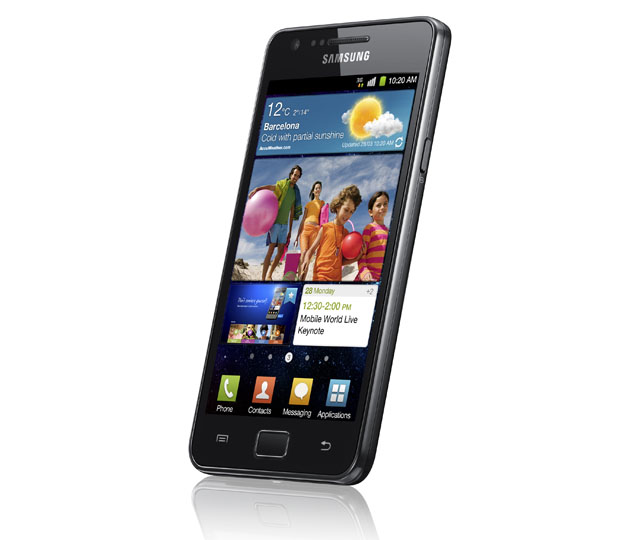news National broadband provider iiNet has launched itself into the cut-throat post-paid mobile phone market, announcing plans today to offer Samsung’s Galaxy S II and original Galaxy S smartphones to small business customers on its mobile plan, as well as a little-known handset made by Alcatel-Lucent.
The company has previously offered SIM-only plans to customers, based on access to Optus’ mobile network, but it will now offer handsets as well. It plans to extend its range in future.
The company’s chief technology officer — who appears to have also taken on a role as chief executive of iiNet’s business division — said the latest offering from the company would meet the “growing demand from organisations looking for a better alternative”.
“The fact you can mix-and-match a contract-free SIM card with a mobile phone means you can create a plan that meets your business needs, no matter your budget,” Bader said. ” “We chose to offer Android phones first because they’re well known as a flexible platform for future innovation. However, we understand that there’s a demand to support a broader range of devices and we will consider extending our offerings soon.”
iiNet’s mobile plans with handsets appear relatively competitively priced compared with offerings by other mobile telcos. For example, the company will offer Samsung’s Galaxy S II handset — one of Australia’s most popular smartphones at the moment — for $30 per month in handset repayment fees over a 24 month contract. There are three SIM plans on offer, at $14.95, $29 and $49 price points.
So for example, buying a Galaxy S II handset on a $29 plan with 1.5GB of data and $660 worth of “included value” call costs would cost $59 a month all up. For $50, under current pricing, Vodafone offers a similar plan with 500MB of data on the same handset.
opinion/analysis
To be honest, I am not yet sold on the idea that iiNet should be selling smartphones, with a view to becoming a mobile network reseller. Sure, most of the fixed-line ISPs and telcos in Australia’s telecommunications sector are gradually moving in this direction. However, iiNet’s core strengths are not in mobile, and I doubt that the company will have the gumption to really push hard into the hyper-competitive mobile industry.
I would personally rather see iiNet continue to focus on fixed-line telecommunications, which is an area it knows really well. Competition in this sector is gradually decreasing, with most players having exited through acquisition over the past few years, and there are only a handful of players left. When this sort of thing happens, innovation suffers. iiNet, as one of the Australian ISPs which has traditionally focused on innovation in fixed-line, would be best-served by continuing to do so.
Small business owners (such as myself) don’t necessarily want to get their mobile phone from their ISP, unless there are a great deal of benefits from doing so. There are already enough great mobile phone plans out there. It just doesn’t seem like a space where iiNet can add value on top of what already exists in the marketplace.
Image credit: Samsung, iiNet



Makes perfect sense to me for them to start becoming a reseller of mobile technology. Why? Because peoples’ workforces are becoming more mobile, and businesses want to still have some degree of governance over them.
This allows them to setup full layer 2 VPN’s on the devices allowing them to push the devices through their firewalls, and their infrastructure.
You should really see it as a whole encompassing product that they can sell. Which has worked really well for Telstra (granted they owned their own network). Businesses tend to want that.
Selling mobiles is a great move for iiNet – to my mind they are limited in their expansion options in fixed line and are looking for other markets. They are already expanding into IP TV and VOIP with some success. NBN isn’t ready for widescale take-up yet but they have plans available. Mobile is a completely untapped market for them.
Timing I’m unsure of. Vodafail’s purchase of 3 has caused nothing but problems for me – scratch one competitor with high churn in the mid-range market. But iiNet have worked well to acquire a large customer base in fixed-line services and are still slowly ironing out the customer service issues from their acquisitions. Perhaps they should wait until the customer service levels improve before taking on the headache of a completely new service line.
I don’t like their proposed plans – they need to leverage their fixed line customer base with competitive package deals. I also expect to see more smartphone options – iPhone, Blackberry and HTC especially.
I agree on the package deals side — I more expected to see bundling from them, rather than these simplistic plans etc.
“So for example, buying a Galaxy S II handset on a $29 plan with 1.5GB of data and $660 worth of “included value” call costs would cost $49 a month all up.”
Shouldn’t that be $59.
Yup, apparently I can’t do basic sums :) Fixed.
I’ve been using iiNet’s mobile service since July and I must say that I love it. I don’t really have any issues with coverage using any of the 3 networks so for me the difference is in price and service. These are two areas that iiNet really excels at. Their customer service actually cares about the customers and their prices are very reasonable for a SIM only service.
Interesting. I would consider using them if they had access to Telstra’s Next G network. I consider the networks of Optus and Vodafone to be sub-standard.
Comments are closed.